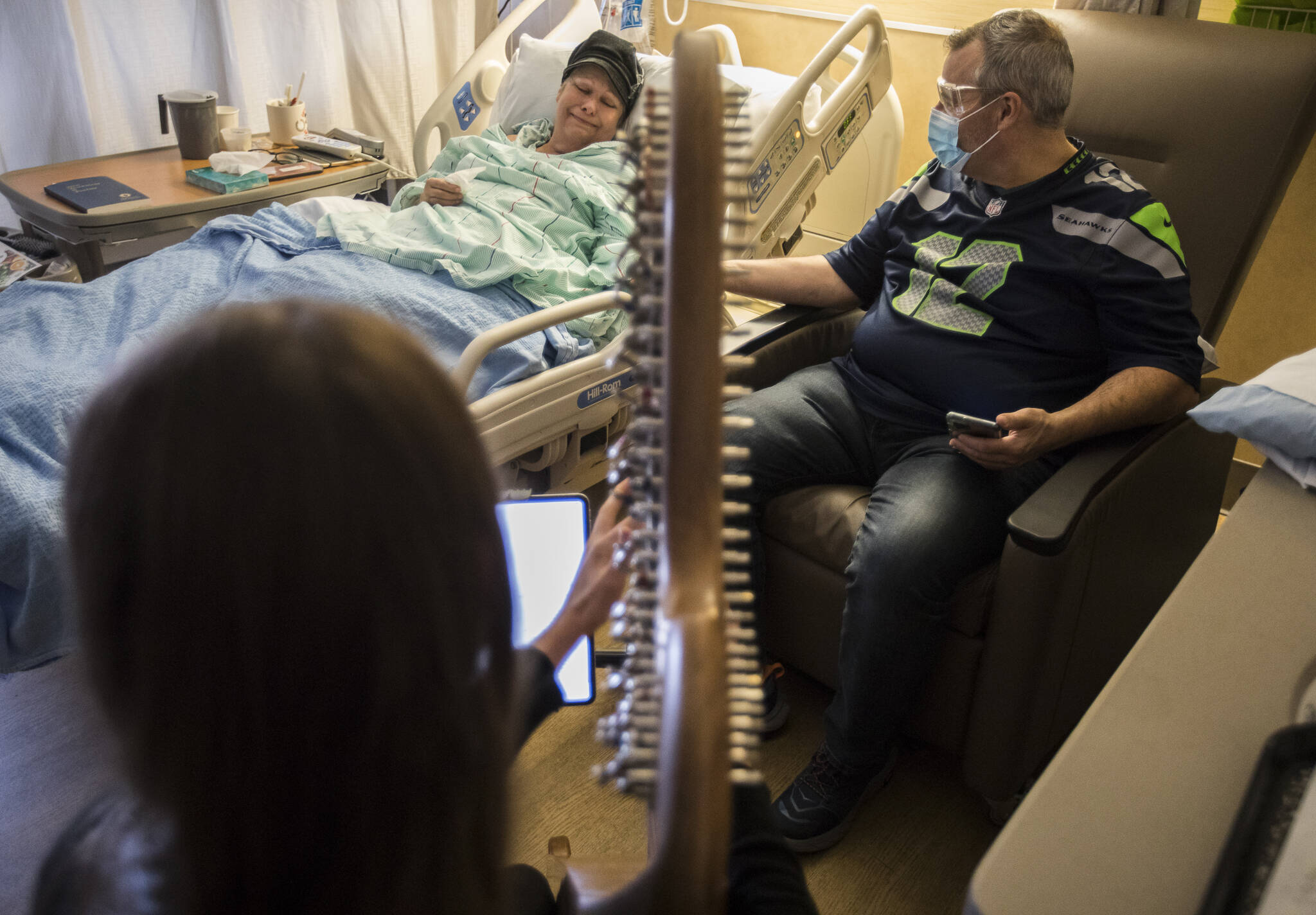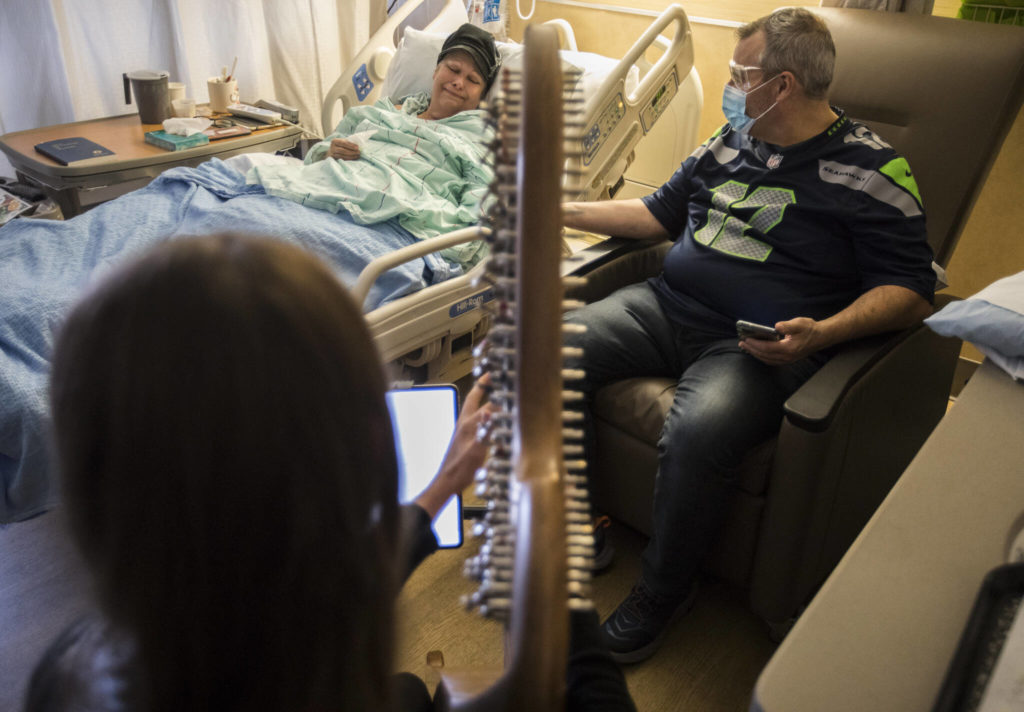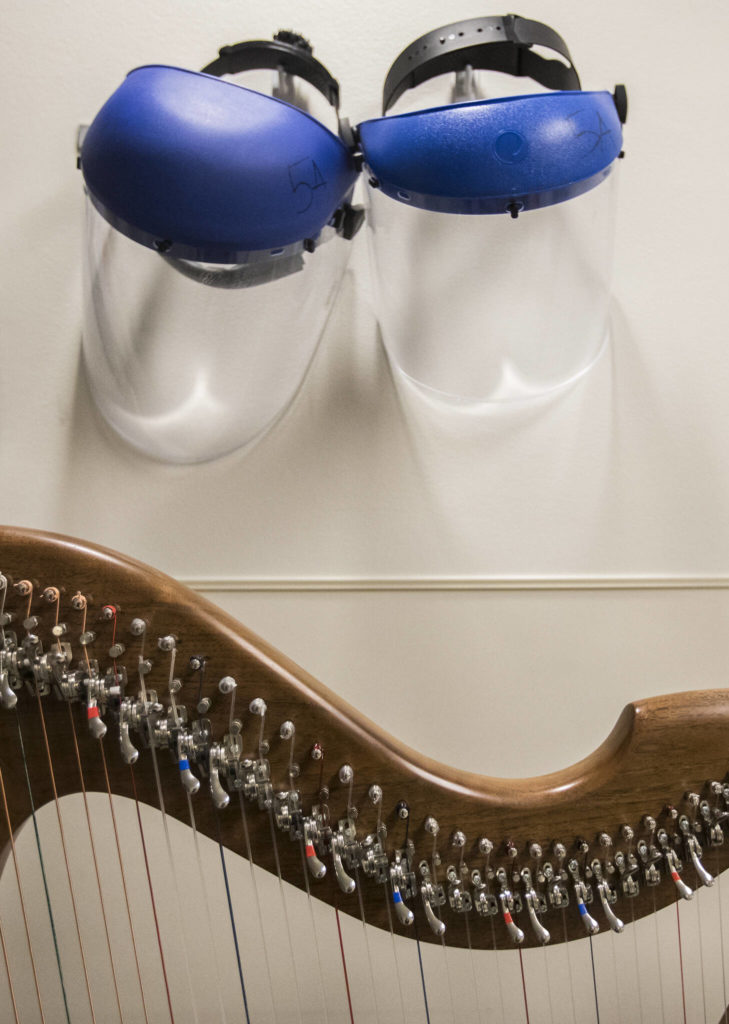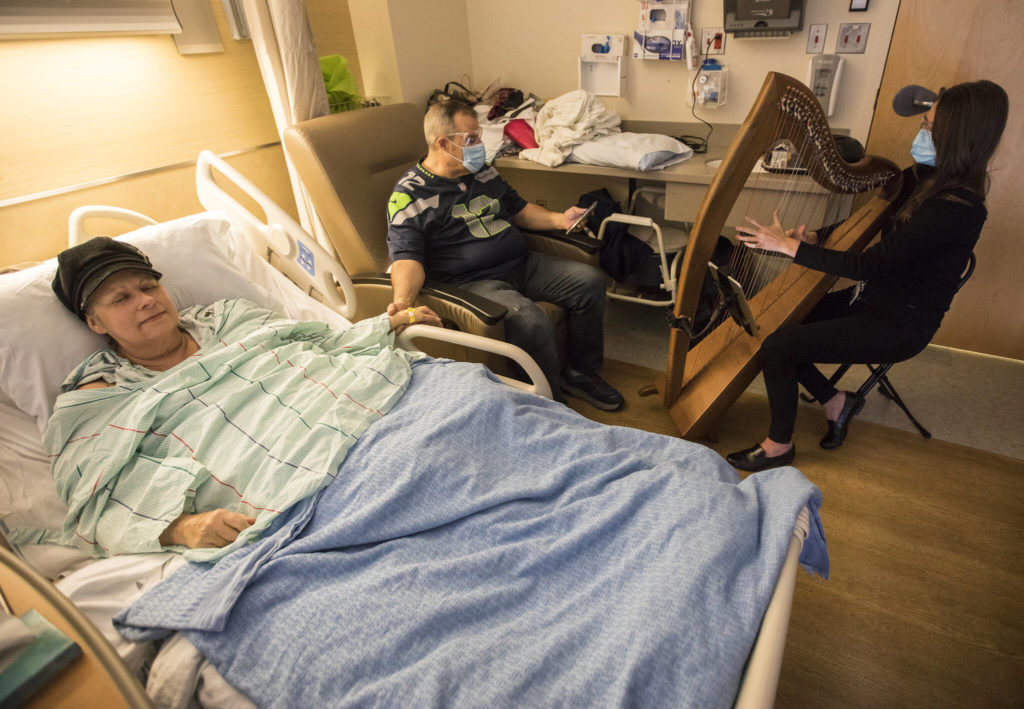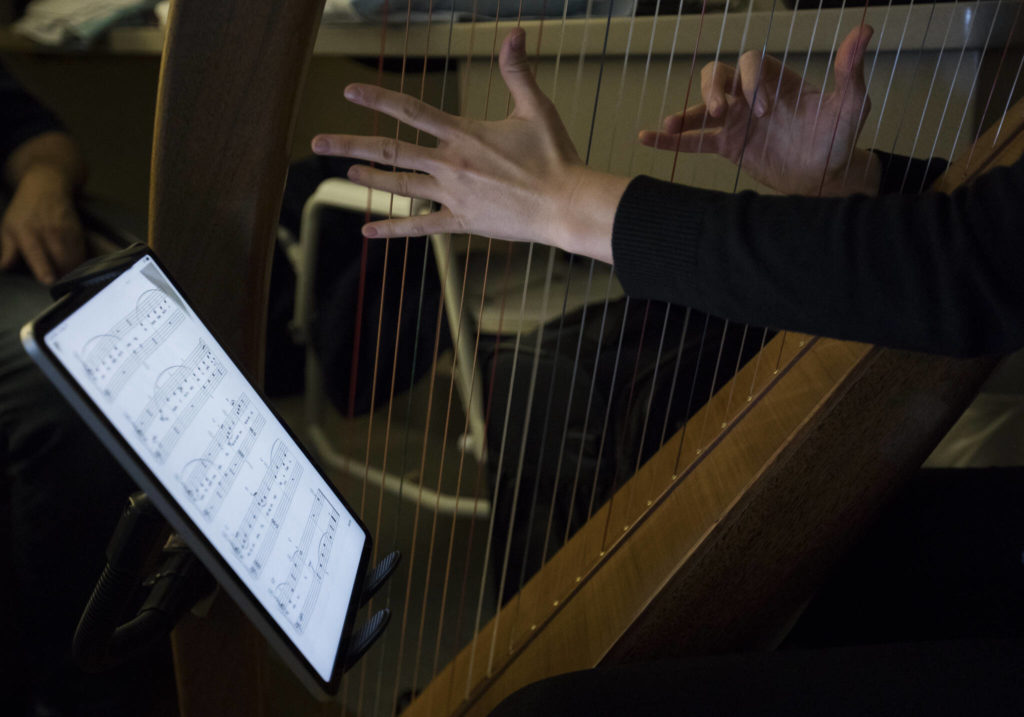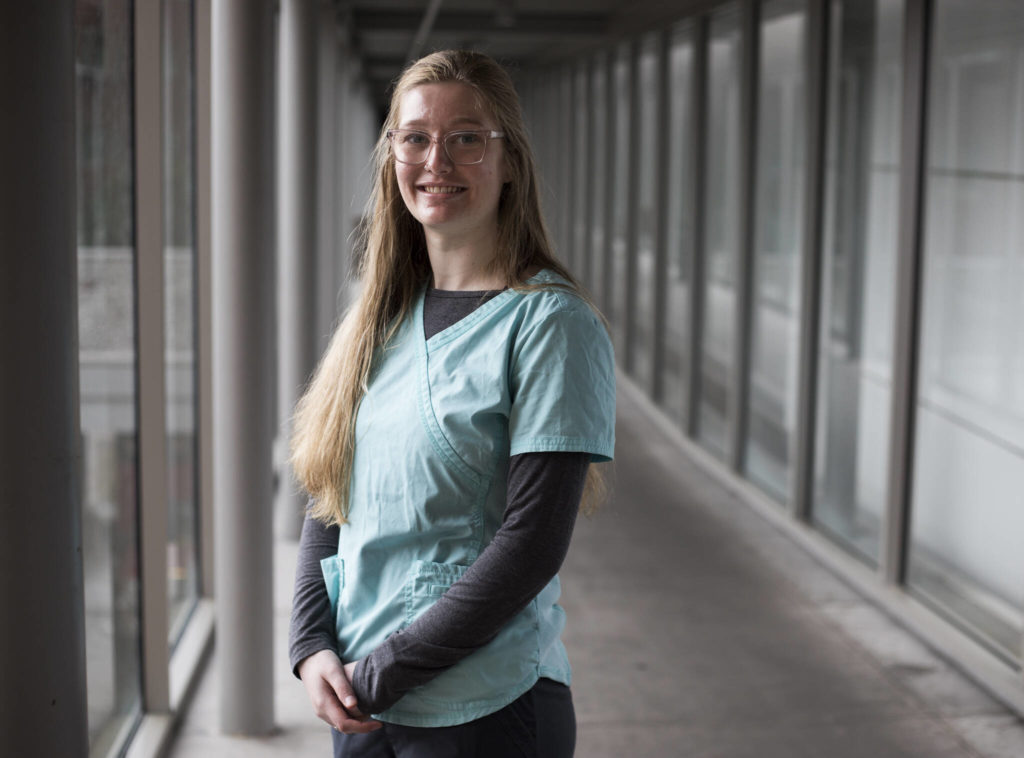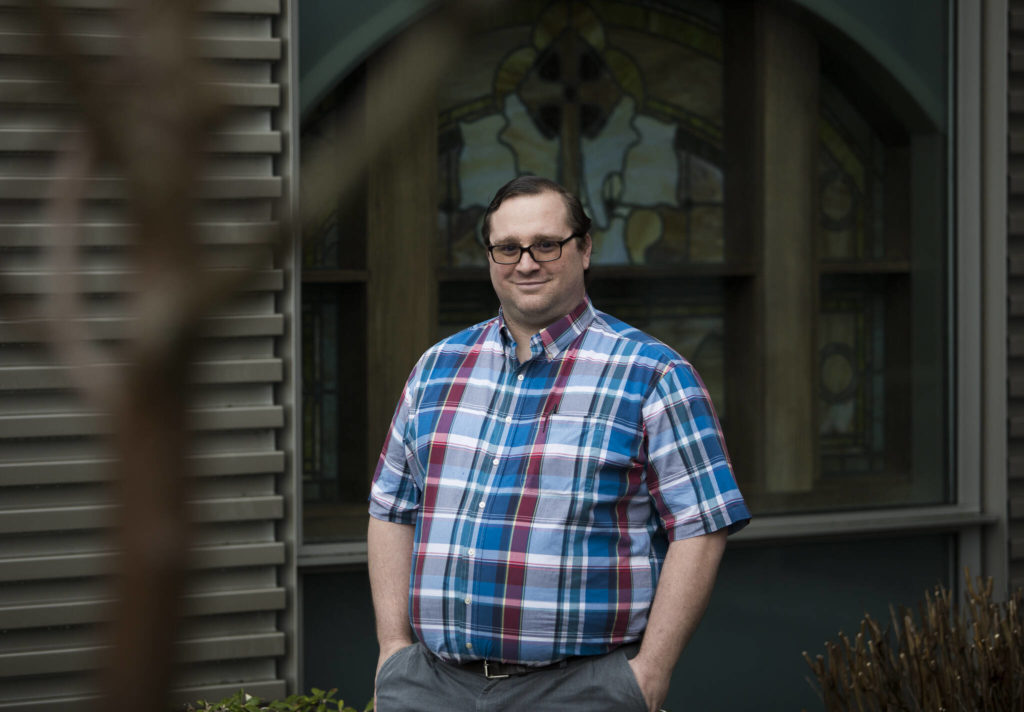EVERETT — Sunlight pours into the cancer unit on the third floor of Providence hospital, and April Mitchell steps aside for nurses wheeling a sleeping patient down the halls.
Then she carts her hefty lever harp into the elevator.
Mitchell, a therapeutic musician, plays for people who are sick or dying. A growing body of evidence suggests it can improve patients’ pain, stress, memory, immune system and more, according to the American Psychological Association.
Mitchell was trained to not talk and let the harp do the work.
“I don’t 100% follow that training,” she told The Daily Herald with a smile. “I think sometimes people need to talk.”
Mitchell rolls her instrument into a hospital room. Shelly Holmgren beams. A rendition of “Silent Night” echoes through the halls. Holmgren calls it “absolute magic.”
For some patients, the harpist is the only person coming to their room, giving them a break from thinking about their illness and the place they are stuck in.
As the coronavirus pandemic marches into its third year, hospitals are as strained as ever. The omicron variant has pushed infections to record highs. Non-emergency surgeries have been paused statewide. With few exceptions, visitors aren’t allowed. The Washington National Guard was on its way to help at Providence Regional Medical Center Everett and other hospitals in the state.
Holmgren has been in the hospital with multiple myeloma, a type of blood cancer, since November. Her 63rd birthday came and went last month as she sat there in her blue gown.
“My bones were like chalk,” Holmgren said. “They were just cracking.”
People told her it was a bad time to get sick. She didn’t like to hear that, but she agreed. It’s been a bad time to get sick for a long time now.
On Jan. 21, 2020, health officials announced the first patient in the United States with a new kind of coronavirus was being treated at this very hospital in Everett.
Two years later, people like Holmgren still suffer from indirect consequences of the pandemic. She hasn’t been able to see much of her family.
A week before Christmas, her brother got a visitor pass. They held hands. He told her to fight.
“I don’t sink into a black hole,” Holmgren said. “That’d be so easy.”
Instead, she finds happier things to talk about, like her time on “Radical Sabbatical,” an old reality TV show about people quitting day jobs and following their dreams. Holmgren opened La Conner’s Queen of the Valley bed and breakfast in front of those TV cameras. She talks about her favorite band, The Four Bitchin’ Babes, and their love song to bald men. She played it for many bald guests.
One time she got the babes to play a show and sleep at her inn.
“It was the best day of my life,” she said.
Holmgren laughs and grins. She also cries.
As promised, Mitchell learned to play a lullaby Holmgren used to sing to her children. Wearing goggles and a mask, the harpist’s nimble fingers glided down the instrument.
Then a holiday tune, “Have Yourself a Merry Little Christmas,” elicits tears. Mitchell’s voice doesn’t quaver on the line: “Next year all your troubles will be miles away.”
“No song has ever affected me like this,” Holmgren said. “I don’t know if I’ll have a next year. But this song gives me hope that I will.”
Weeks later, she’s still at the hospital. Her chemotherapy appears to be working, she said.
Providence Regional Medical Center juts out of a quiet neighborhood in north Everett.
Early on in the pandemic, neighbors would cheer and make noise each night to honor health care workers and first responders. Those little traditions have since fizzled out. But hospital staff are still bearing the weight of the pandemic, amid dwindling ranks and rampant burnout.
Mitchell plays three days a week. She’s part of a spiritual care team, along with Chaplain Josh Wilson, who visits dying patients, often praying with them or promising to deliver a final message to family.
The spiritual work, Wilson said, is especially important when patients feel so alone.
“Isolation,” he said, “is painful for the human soul, the human spirit.”
‘I don’t know if I want to do this anymore’
Even on busy days, Brooke Desjardins can find some time to braid patients’ hair.
“I’m an awful braider,” she said. “But you know, girls with long hair, they love their hair braided. So I try.”
The certified nursing assistant still lives with her parents in Stanwood. When the pandemic hit, she was 19. She immediately started working in the COVID ward. She was scared of bringing the virus home to her family.
These days, she picks up extra shifts to save up for her next quarter at Everett Community College, where she’s on the pre-nursing track.
Each day, she leaves the house 30 minutes early, listening to Drake or Post Malone in the car, mentally preparing for her shift. Schoolwork occupies her morning. She gets done at the hospital at 11 p.m.
It’s a job she has considered leaving. Plenty of co-workers already have in what has been called the “great resignation,” or the Big Quit.
Travel nurses have helped fill the gaps. Desjardins, who has lived in Stanwood her whole life, listens to their stories about working in states without mask mandates or other preventative measures.
For a few months, Desjardins left the COVID ward to work in intensive care. There, coronavirus patients were intubated and couldn’t speak.
“I was like, ‘I don’t know if I want to do this anymore,’” she said.
It was harder to get to know patients. In the normal COVID ward, she could sit and talk.
There was the time she stayed with a coronavirus patient who was often in tears about eating dinner alone each night. So Desjardins sat with her in full protective gear.
“I was sweating, but it was so worth it,” she said. “The gowns we have, they’re just like sweat suits. You sweat and it makes you sweat even more.”
In the COVID ward, patients are often so fragile that a trip to the bathroom is too risky. Oxygen levels could drop and they might have to be intubated. Sometimes, it’s Desjardins’ job to insist they use a bedpan.
“That’s hard,” she said, “because it’s kind of like a dignity thing, you know?”
As a nursing assistant answering phone calls at the front desk, Desjardins often shoulders the blame for things out of her control. Visitor restrictions. How many personal belongings relatives can drop off. Someone’s declining health. Someone’s death.
It’s hard to talk with her friends about realities of life in the hospital.
“It’s just hard to see people going to stores with their masks off or having big parties,” Desjardins said. “But you know, all I can do is just prepare to come to work and just help people.”
The Stanwood native worked in hospice before the pandemic, and she grew less uncomfortable with death.
COVID deaths feel different. They’re so sudden and jarring. This year she cared for a patient who caught the virus after his destination wedding. After severe complications, the man died.
“And I walked downstairs to give the wife all of his belongings. That was so hard,” Desjardins said. “It was awful to be like, ‘Here’s your deceased husband’s wallet.’ It was awful.”
‘It’s real’
At 11 years old, Mitchell’s first harp gig was a funeral. She was busking in California with her siblings, lugging her instrument in a stroller and happily accepting tips from affluent vacationers. A local heard the children’s original music and asked them to play at a family funeral.
“So I was automatically introduced to playing for the realm of celebrating life and celebrating death,” she said.
In her free time, she plays with friends. Before COVID, she used to play weddings. Those have slowed down. She still plays at funerals.
In the hospital, she has seen how music can heal not only patients, but their families.
“A lot of people say their goodbyes when I’m there,” Mitchell said. “Most people will say, ‘It’s OK, continue, I’m just crying and letting it out.’”
Some performances are joyous, even romantic.
As retirement homes were hit with waves of infections, Mitchell brought her harp into the rooms of isolated elders. She lugged along an amplifier for one hard-of-hearing man who somehow always had tiny bottles of booze on hand. He would insist Mitchell roll him into his sweetheart’s room down the hall, where she would serenade them on a double date, harp blasting.
“He was a hoot and a holler,” Mitchell recalled. “We just sang old-timey songs and jammed out.”
The hardest part of the job right now, Mitchell said, is working with an exhausted, overworked health care staff — and not being able to do much about it.
“I wish I had the capability of playing for hours and hours and hours, because I see so many staff members who could benefit from this,” she said.
For Chaplain Wilson, it has been hard to navigate a new strain of denial in the hospital. Denial is a normal part of grieving. But in the era of COVID, denial around the disease itself creates another hurdle for workers and families suffering loss.
“Part of our work is what we call ‘the prophetic.’ That truth-speaking,” Wilson said. “Yes, this is where we’re really at. This disease that some of us took for granted is now at your doorstep. It’s real and it’s killed your loved one.”
Then some deaths have been indirectly caused by the pandemic. When surgical units were first shut down due to skyrocketing COVID hospitalizations, Wilson visited a parent who could no longer get metastasized cancer removed.
“This lovely patient who was supposed to have their cancer removed was now dying in our cancer ward,” he said. “There was anger. There was sadness. There was frustration. Because all of this might have been avoided.”
For the first time since the beginning of the pandemic, Providence paused non-emergency surgeries this month, including some heart procedures and surgeries for cancer patients. Then last week the state ordered all hospitals to do the same.
Wilson often consoles families watching their loved ones die. He sometimes joins them in tears.
“How can you not?” he said.
Then he washes his hands, a ritual he’s been doing since long before the pandemic.
“For me, it’s a time of prayer and reflection where I say, ‘God, this case is beyond me,’” Wilson said.
After that?
“I go home,” he said. “Try to go home on time. Hug my family.”
Claudia Yaw: 425-339-3449; claudia.yaw@heraldnet.com. Twitter: @yawclaudia.
Talk to us
> Give us your news tips.
> Send us a letter to the editor.
> More Herald contact information.
